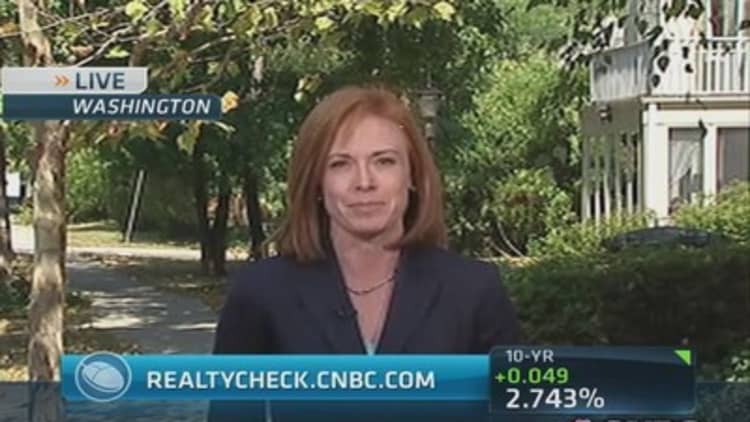Real estate stocks rallied, and mortgage rates fell, as fears of Fed "tapering," at least in the short term, evaporated.
The Federal Reserve will continue to buy U.S. Treasury securities and agency mortgage-backed securities, both of which have kept mortgage rates well below historical norms for the past few years. Fed governors cited the recent rise in mortgage rates in their list of concerns that kept them from pulling out of asset purchases.
(Read more: Druckenmiller: Fed just lost chance for a 'freebie' )

"It's a good day to get a mortgage rate," wrote Dan Green, author of The Mortgage Reports blog, immediately following Wednesday's Fed announcement.
But was it a good day for the housing market? What did it really say about the health of the recovery? It's like when you were a kid, and you don't have to go school because you are sick. Great! No school! Except you're still sick. That is exactly what the Federal Reserve's message was to the U.S. housing market.
"An insipid victory for housing markets," tweeted economist Sam Chandan. "Fed doesn't believe rebound can be sustained absent artificially low mortgage rates."
Ever since members of the Federal Reserve began hinting about a "taper" of asset purchases back in May, mortgage rates have been rising. The rate on the 30-year fixed conforming loan is over a full percentage point higher than it was in May; of course back in May it was near historic lows.
(Read more: Can the mortgage market crash again?)

The rise in rates put the brakes on the housing recovery, sending both mortgage applications and home sales lower during the summer months. While home builders continued to tout demand and affordability, they could not help but notice fewer buyers in their showrooms.
"We are experiencing the same as others who have reported, decent spring followed by a poor summer," said Stephen Paul of Mid-Atlantic Builders. "Through June, sales were up 16 percent then dropped off the table in July and August."
Home builder confidence stalled nationally in September, after rising steadily, especially at the beginning of 2013.
"While builder confidence is holding at the highest level in nearly eight years, many are reporting some hesitancy on the part of buyers due to the sharp increase in interest rates," said Rick Judson, the National Association of Home Builders' chairman.
If interest rates retreat to where they were at the beginning of the year, mortgage refinances will likely rebound again, especially since they have dropped so dramatically in the past six months.
As for home sales, that is not an easy call. Sales have been hampered not just by rising mortgage rates, but by very low inventory, anemic construction, and still-pervasive negative equity among potential move-up buyers. Lackluster job and wage growth, especially among younger Americans, has not helped either.
(Read more: Tepper: Fed wants growth first, second, and third)
We also know that while the Federal Reserve may not be tapering now, it will have to eventually. Some say it should do so sooner rather than later.
"Rip this Band-Aid off already," said Peter Boockvar of the Lindsey Group. "There will never be the right time to cut back, and today was the perfect opportunity to do so because the market was ready for it. Playing games now over this with the market will not smooth the eventual ease."
Boockvar pointed to the home buyer tax credit, which boosted sales briefly, only to expire and send sales slumping again. The Fed is clearly afraid of stalling the housing recovery now.
(Read more: Map: Tracking the recovery)
"Clearly the Fed has been spooked by the extent of the surge in long-term interest rates over the past couple of months and the impact that now appears to be having on the housing market," said Paul Ashworth at Capital Economics. "But there is a dangerous circularity here because the initial rise in long-term rates was largely a response to the Fed hinting that it would begin to reduce its asset purchases sometime in the second half of the year."
The confusion the Fed has now created could in fact result in more volatility in the credit and housing markets.
—By CNBC's Diana Olick. Follow her on Twitter @Diana_Olick.
Questions?Comments? facebook.com/DianaOlickCNBC.


